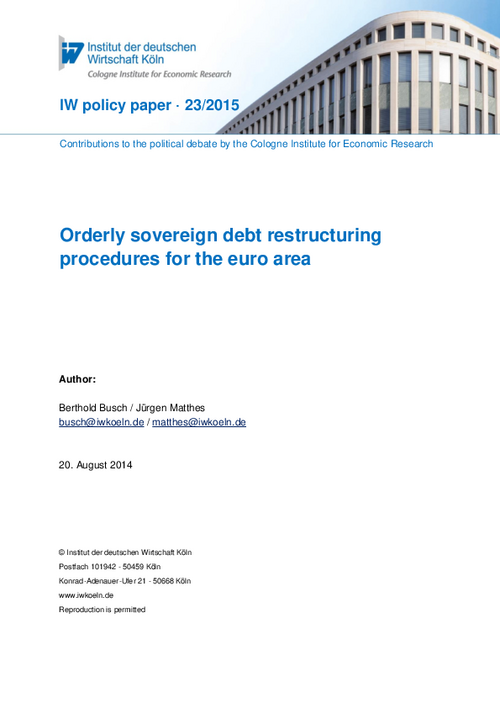The case of Greece has reveiled an institutional gap remains in the institutional framework of EMU: an orderly insolvency mechanism for sovereign states. After weighing the pros and cons of such a mechanism, requirements are devised to max-imise the advantages and minimise the potential drawbacks. Overall, an insolvency procedure for sovereign states needs to be effective, reliable and fair. It should limit the negative effects of a default for the debtor country, but must not provide incen-tives for the debtor country to default strategically. Bearing these requirements in mind and based on a combination and change of existing proposals, this study pro-poses an insolvency regime for sovereign states, but one only as an ultima ratio.
As a rule, the debtor country starts the procedure - and is then supported by ESM bridge financing and can benefit from a moratorium on debt service, litigation and enforcement in order to sustain basic government functions. These support measures are time-limited and go hand in hand with a robust reform programme of the ESM to avoid problematic incentives for fiscal policy. The ESM can also trigger the procedure under restrictive conditions as an ultima ratio, if the debtor country clearly delays this step. The ESM treaty (also) has to be changed to ensure that the insolvency mechanism is triggered, if a country applies for ESM loans but proves to be insolvent instead of illiquid. Finally, if an ESM programme for a formely illiquid country ends unsuccessfully, an insolvency procedure is triggered automatically.
An institutionalised framework (with time-limited stages) should be obligatory for debt restructuring negotiations between creditors and the debtor country. After a brief phase for market based negotiations, this framework kicks in and involves as a key feature a new judicial body (located at the Court of Justice of the European Un-ion) that moderates the negotiations with increasing intensity over time. To raise the incentives for the negotiating parties to come to a constructive conclusion, the judi-cial body can eventually issue a binding proposal for the debt restructuring. To be effective the procedure particularly has to impede so-called holdout strategies. To achieve this aim, the collective action clauses in sovereign bonds of euro area countries must above all be changed to a so-called single limb voting procedure.
The credibility of the insolvency mechanism is essential, so as to set incentives for sound fiscal policy. To this end, in particular contagion effects on the financial sys-tem need to be sufficiently contained. Mainly banks need to be better capitalised and the sovereign bonds of euro area countries must no longer be considered risk-free in banking regulation. To reduce the excessive exposures of many banks to bonds, especially of their own state, the ECB as the single supervisor should induce overexposed banks to sell the respective bonds to the ECB as part of the current public sector purchase programme. Like this portfolio adjustment, other required changes and the reduction of government debts need time. The new insolvency procedure can be only be implemented in the medium term, but should be decided on in the short term.


![[Translate to English:] Das Gebäude des Weißen Hauses in Washington, D.C. in den Vereinigten Staaten von Amerika. [Translate to English:] Das Gebäude des Weißen Hauses in Washington, D.C. in den Vereinigten Staaten von Amerika.](/fileadmin/_processed_/c/1/csm_GettyImages-2161499385_White_House_Editorial_884306add8.jpg)